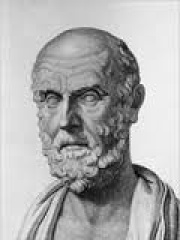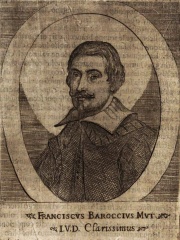







The Most Famous
MATHEMATICIANS from Greece
This page contains a list of the greatest Greek Mathematicians. The pantheon dataset contains 1,004 Mathematicians, 11 of which were born in Greece. This makes Greece the birth place of the 21st most number of Mathematicians behind Norway, and Japan.
Top 10
The following people are considered by Pantheon to be the top 10 most legendary Greek Mathematicians of all time. This list of famous Greek Mathematicians is sorted by HPI (Historical Popularity Index), a metric that aggregates information on a biography's online popularity. Visit the rankings page to view the entire list of Greek Mathematicians.

1. Hippocrates of Chios (470 BC - 410 BC)
With an HPI of 70.74, Hippocrates of Chios is the most famous Greek Mathematician. His biography has been translated into 39 different languages on wikipedia.
Hippocrates of Chios (Ancient Greek: Ἱπποκράτης ὁ Χῖος; c. 470 – c. 421 BC) was an ancient Greek mathematician, geometer, and astronomer. He was born on the isle of Chios, where he was originally a merchant. After some misadventures (he was robbed by either pirates or fraudulent customs officials) he went to Athens, possibly for litigation, where he became a leading mathematician. On Chios, Hippocrates may have been a pupil of the mathematician and astronomer Oenopides of Chios. In his mathematical work there probably was some Pythagorean influence too, perhaps via contacts between Chios and the neighboring island of Samos, a center of Pythagorean thinking: Hippocrates has been described as a 'para-Pythagorean', a philosophical 'fellow traveler'. "Reduction" arguments such as reductio ad absurdum argument (or proof by contradiction) have been traced to him, as has the use of power to denote the square of a line.

2. Meton of Athens (500 BC - 460 BC)
With an HPI of 69.92, Meton of Athens is the 2nd most famous Greek Mathematician. His biography has been translated into 30 different languages.
Meton of Athens (Greek: Μέτων ὁ Ἀθηναῖος; gen.: Μέτωνος) was a Greek mathematician, astronomer, geometer, and engineer who lived in Athens in the 5th century BC. He is best known for calculations involving the eponymous 19-year Metonic cycle, which he introduced in 432 BC into the lunisolar Attic calendar. Euphronios says that Colonus was Meton's deme.

3. Conon of Samos (280 BC - 221 BC)
With an HPI of 67.38, Conon of Samos is the 3rd most famous Greek Mathematician. His biography has been translated into 30 different languages.
Conon of Samos (Greek: Κόνων ὁ Σάμιος, Konōn ho Samios; c. 280 – c. 220 BC) was a Greek astronomer and mathematician. He is primarily remembered for naming the constellation Coma Berenices.

4. Theaetetus (417 BC - 369 BC)
With an HPI of 66.49, Theaetetus is the 4th most famous Greek Mathematician. His biography has been translated into 28 different languages.
Theaetetus of Athens (; Ancient Greek: Θεαίτητος Theaítētos; c. 417 – c. 369 BCE), possibly the son of Euphronius of the Athenian deme Sunium, was a Greek mathematician. His principal contributions were on irrational lengths, which was included in Book X of Euclid's Elements and proving that there are precisely five regular convex polyhedra. A friend of Socrates and Plato, he is the central character in Plato's eponymous Socratic dialogue. Theaetetus, like Plato, was a student of the Greek mathematician Theodorus of Cyrene. Cyrene was a prosperous Greek colony on the coast of North Africa, in what is now Libya, on the eastern end of the Gulf of Sidra. Theodorus had explored the theory of incommensurable quantities, and Theaetetus continued those studies with great enthusiasm; specifically, he classified various forms of irrational numbers according to the way they are expressed as square roots. This theory is presented in great detail in Book X of Euclid's Elements. Theaetetus was one of the few Greek mathematicians who was actually a native of Athens. Most Greek mathematicians of antiquity came from the numerous Greek cities scattered around the Ionian coast, the Black Sea and the whole Mediterranean basin. He evidently resembled Socrates in the snubness of his nose and bulging of his eyes. This and most of what is known of him comes from Plato, who named a dialogue after him, the Theaetetus. He apparently died from wounds and dysentery on his way home after fighting in an Athenian battle at Corinth, now presumed to have occurred in 369 BC; some scholars argue alternately for 391 BC as his date of death, the date of an earlier battle at Corinth. The crater Theaetetus on the Moon is named after him.

5. Aristyllus (400 BC - 300 BC)
With an HPI of 65.94, Aristyllus is the 5th most famous Greek Mathematician. His biography has been translated into 24 different languages.
Aristyllus (Greek: Ἀρίστυλλος; fl. c. 261 BC) was a Greek astronomer, presumably of the school of Timocharis (c. 300 BC). He was among the earliest meridian-astronomy observers. Six of his stellar declinations are preserved at Almajest 7.3. All are exactly correct within his over-cautious rounding to 1/4 degree. See discussion (and lessons) at DIO 7.1 ‡1 p. 13 (2007). Aristyllus was long mis-dated to c. 300 BC (which made his data look among the poorest of the ancients); but when his correct date was found by least-squares (Isis 73:259-265 [1982] p. 263), it was realized that his star declinations' accuracy was unexcelled in antiquity. His data suggest that he worked in Alexandria: see DIO 4.1 ‡3 Table 3 p. 45 (2004). A lunar crater, Aristillus, aptly near the Moon's meridian and at a lunar latitude roughly equal to the terrestrial latitude of Alexandria, is named after him.

6. Diocles (240 BC - 180 BC)
With an HPI of 61.66, Diocles is the 6th most famous Greek Mathematician. His biography has been translated into 20 different languages.
Diocles (Ancient Greek: Διοκλῆς; c. 240 BC – c. 180 BC) was a Greek mathematician and geometer.

7. Geminus (0 - 100 BC)
With an HPI of 59.75, Geminus is the 7th most famous Greek Mathematician. His biography has been translated into 23 different languages.
Geminus of Rhodes (Greek: Γεμῖνος ὁ Ῥόδιος), was a Greek astronomer and mathematician, who flourished in the 1st century BC. An astronomy work of his, the Introduction to the Phenomena, still survives; it was intended as an introductory astronomy book for students. He also wrote a work on mathematics, of which only fragments quoted by later authors survive.

8. Francesco Barozzi (1537 - 1604)
With an HPI of 59.21, Francesco Barozzi is the 8th most famous Greek Mathematician. His biography has been translated into 15 different languages.
Francesco Barozzi (9 August 1537 – 23 November 1604), in Latin Franciscus Barocius, was an Italian mathematician, astronomer and humanist.

9. Dinostratus (390 BC - 320 BC)
With an HPI of 58.29, Dinostratus is the 9th most famous Greek Mathematician. His biography has been translated into 16 different languages.
Dinostratus (Greek: Δεινόστρατος; c. 390 – c. 320 BCE) was a Greek mathematician and geometer, and the brother of Menaechmus. He is known for using the quadratrix to solve the problem of squaring the circle.

10. Cahit Arf (1910 - 1997)
With an HPI of 58.27, Cahit Arf is the 10th most famous Greek Mathematician. His biography has been translated into 19 different languages.
Cahit Arf (Turkish: [dʒaːhit aɾf]; 24 October 1910 – 26 December 1997) was a Turkish mathematician. He is known for the Arf invariant of a quadratic form in characteristic 2 (applied in knot theory and surgery theory) in topology, the Hasse–Arf theorem in ramification theory, Arf semigroups and Arf rings.
People
Pantheon has 11 people classified as Greek mathematicians born between 500 BC and 1951. Of these 11, 1 (9.09%) of them are still alive today. The most famous living Greek mathematicians include Demetrios Christodoulou. The most famous deceased Greek mathematicians include Hippocrates of Chios, Meton of Athens, and Conon of Samos.
Living Greek Mathematicians
Go to all RankingsDeceased Greek Mathematicians
Go to all RankingsHippocrates of Chios
470 BC - 410 BC
HPI: 70.74
Meton of Athens
500 BC - 460 BC
HPI: 69.92
Conon of Samos
280 BC - 221 BC
HPI: 67.38
Theaetetus
417 BC - 369 BC
HPI: 66.49
Aristyllus
400 BC - 300 BC
HPI: 65.94
Diocles
240 BC - 180 BC
HPI: 61.66
Geminus
HPI: 59.75
Francesco Barozzi
1537 - 1604
HPI: 59.21
Dinostratus
390 BC - 320 BC
HPI: 58.29
Cahit Arf
1910 - 1997
HPI: 58.27


